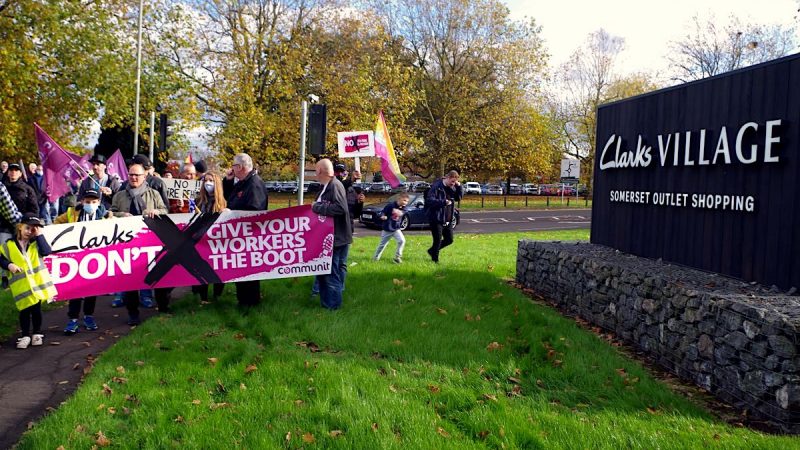
It was this time last year that we were first starting to discuss industrial action. At that time, I had worked at Clarks in my town – Street in Somerset, where Clarks was founded – for 17 years. I had colleagues who had been there even longer, some for 20 or even 30 years.
In May 2021, my colleagues and I were summoned to a meeting and told we’d be subject to new terms. They were non-negotiable, wide-ranging and encompassed almost every facet of our work. They included everything from a reduction in hourly wage, sick pay and annual holidays, to more outlandish and punitive measures, like the removal of ten-minute coffee breaks and complimentary hot drinks. The message was simple: if we didn’t accept the changes, we would lose our jobs.
On October 4th 2021, our strike began. The outpouring of support that we received at that point from people across the country was extraordinary. From celebrities to people on social media to Street residents, it gave us the strength to keep going. Eight weeks later a resolution was reached, and we returned to work. Our pay was protected, and critically, nobody was dismissed.
This was a fantastic result for myself and my colleagues, yet one that may soon be no longer possible. Right now, the government is introducing a new plan via statutory instrument to allow bosses in all sectors to replace striking workers with people from an agency – strike-breaking to you and me. The ban on using agency staff to fill in for striking workers has been in place since 1973. Even Margaret Thatcher did not try to remove it.
This is not being done by an act of parliament, by legislation open to scrutiny from the public or by debate in the chamber, but through a stroke of a pen from a cabinet minister. This plan is being snuck in through the back door and would severely weakening the democratic right to strike.
Look, we do get it. We know strikes can be disruptive. Trust me, as someone who spent eight weeks on strike, nobody enjoys them less than those having to strike. A strike is not a holiday. For eight weeks, my colleagues and I had to go home every night facing unbelievable financial and personal uncertainty, often relying on the kindness of strangers to keep us going. A strike is the last line of defence workers have – the right to highlight the value of the work we do to bosses who may not recognise it.
We were fortunately successful in defeating ‘fire and rehire’ in my workplace. Had we not been, I cannot imagine what my life would be like now. I most definitely would not be in my current home. I would have had to move away from my children, and I may even have been homeless.
We cannot allow this government to take away our hard-fought-for right to industrial action. I’d call upon everyone – all members of the public – to resist this change. To contact your MP and encourage them to stand against this new plan. I’d also encourage you to send your support and solidarity to workers at the RMT union who are the current target of the government’s ire and the reason this plan is being introduced.
This plan will, without question, make the lives of working people in this country worse. It would be a gift to employers who wish to use fire-and-rehire tactics. We showed at Clarks last year that with enough of us standing up and resisting something that isn’t right, it can be defeated. It’s time for us to do it again.




More from LabourList
‘The hope that kills you’: Reflections from the final day in Gorton and Denton
MPs, union leaders and organisations react to ‘bruising’ Gorton and Denton result
A gory night for Labour